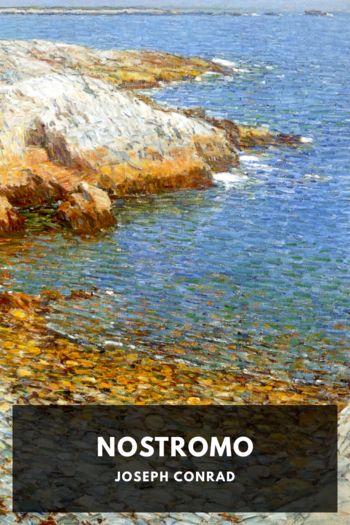Nostromo - Joseph Conrad (books to read fiction .TXT) 📗

- Author: Joseph Conrad
Book online «Nostromo - Joseph Conrad (books to read fiction .TXT) 📗». Author Joseph Conrad
Mrs. Gould knew the history of the San Tome mine. Worked in the early days mostly by means of lashes on the backs of slaves, its yield had been paid for in its own weight of human bones. Whole tribes of Indians had perished in the exploitation; and then the mine was abandoned, since with this primitive method it had ceased to make a profitable return, no matter how many corpses were thrown into its maw. Then it became forgotten. It was rediscovered after the War of Independence. An English company obtained the right to work it, and found so rich a vein that neither the exactions of successive governments, nor the periodical raids of recruiting officers upon the population of paid miners they had created, could discourage their perseverance. But in the end, during the long turmoil of pronunciamentos that followed the death of the famous Guzman Bento, the native miners, incited to revolt by the emissaries sent out from the capital, had risen upon their English chiefs and murdered them to a man. The decree of confiscation which appeared immediately afterwards in the Diario Official, published in Sta. Marta, began with the words: “Justly incensed at the grinding oppression of foreigners, actuated by sordid motives of gain rather than by love for a country where they come impoverished to seek their fortunes, the mining population of San Tome, etc. …” and ended with the declaration: “The chief of the state has resolved to exercise to the full his power of clemency. The mine, which by every law, international, human, and divine, reverts now to the government as national property, shall remain closed till the sword drawn for the sacred defence of liberal principles has accomplished its mission of securing the happiness of our beloved country.”
And for many years this was the last of the San Tome mine. What advantage that government had expected from the spoliation, it is impossible to tell now. Costaguana was made with difficulty to pay a beggarly money compensation to the families of the victims, and then the matter dropped out of diplomatic despatches. But afterwards another government bethought itself of that valuable asset. It was an ordinary Costaguana government—the fourth in six years—but it judged of its opportunities sanely. It remembered the San Tome mine with a secret conviction of its worthlessness in their own hands, but with an ingenious insight into the various uses a silver mine can be put to, apart from the sordid process of extracting the metal from under the ground. The father of Charles Gould, for a long time one of the most wealthy merchants of Costaguana, had already lost a considerable part of his fortune in forced loans to the successive governments. He was a man of calm judgment, who never dreamed of pressing his claims; and when, suddenly, the perpetual concession of the San Tome mine was offered to him in full settlement, his alarm became extreme. He was versed in the ways of governments. Indeed, the intention of this affair, though no doubt deeply meditated in the closet, lay open on the surface of the document presented urgently for his signature. The third and most important clause stipulated that the concession-holder should pay at once to the government five years’ royalties on the estimated output of the mine.
Mr. Gould, senior, defended himself from this fatal favour with many arguments and entreaties, but without success. He knew nothing of mining; he had no means to put his concession on the European market; the mine as a working concern did not exist. The buildings had been burnt down, the mining plant had been destroyed, the mining population had disappeared from the neighbourhood years and years ago; the very road had vanished under a flood of tropical vegetation as effectually as if swallowed by the sea; and the main gallery had fallen in within a hundred yards from the entrance. It was no longer an abandoned mine; it was a wild, inaccessible, and rocky gorge of the sierra, where vestiges of charred timber, some heaps of smashed bricks, and a few shapeless pieces of rusty iron could have been found under the matted mass of thorny creepers covering the ground. Mr. Gould, senior, did not desire the perpetual possession of that desolate locality; in fact, the mere vision of it arising before his mind in the still watches of the night had the power to exasperate him into hours of hot and agitated insomnia.
It so happened, however, that the finance minister of the time was a man to whom, in years gone by, Mr. Gould had, unfortunately, declined to grant some small pecuniary assistance, basing his refusal on the ground that the applicant was a notorious gambler and cheat, besides being more than half suspected of a robbery with violence on a wealthy ranchero in a remote country district, where he was actually exercising the function of a judge. Now, after reaching his exalted position, that politician had proclaimed his intention to repay evil with good to Señor Gould—the poor man. He affirmed and reaffirmed this resolution in the drawing-rooms of Sta. Marta, in a soft and implacable voice, and with such malicious glances that Mr. Gould’s best friends advised him earnestly to attempt no bribery to get the matter dropped. It would have been useless. Indeed, it would not have been a very safe proceeding. Such was





Comments (0)